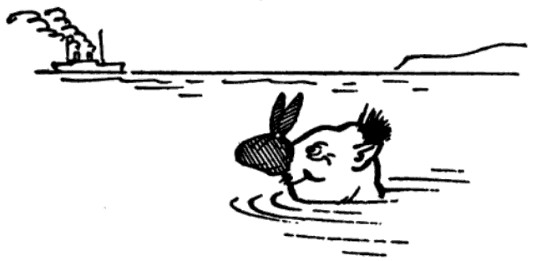I loved thee, beautiful and kind,
And plighted an eternal vow;
So alter’d are thy face and mind,
‘Twere perjury to love thee now.
— Robert, Earl Nugent (1709-1788)
I loved thee, beautiful and kind,
And plighted an eternal vow;
So alter’d are thy face and mind,
‘Twere perjury to love thee now.
— Robert, Earl Nugent (1709-1788)

For myself, I must say that I find [Edward] Lear funniest when he is least arbitrary and when a touch of burlesque or perverted logic makes its appearance. … While the Pobble was in the water some unidentified creatures came and ate his toes off, and when he got home his aunt remarked:
‘It’s a fact the whole world knows,
That Pobbles are happier without their toes,’which once again is funny because it has a meaning, and one might even say a political significance. For the whole theory of authoritarian governments is summed up in the statement that Pobbles were happier without their toes.
— George Orwell, “Nonsense Poetry,” 1945
Marjory Fleming (1803-1811) composed this uniquely terrible poem at age 8:
Three Turkeys fair their last have breathed,
And now this world for ever leaved,
Their Father and their Mother too,
Will sign and weep as well as you,
Mourning for their offspring fair,
Whom they did nurse with tender care.
Indeed the rats their bones have crunch’d,
To eternity are they launch’d;
Their graceful form and pretty eyes
Their fellow fowls did not despise,
A direful death indeed they had,
That would put any parent mad,
But she was more than usual calm
She did not give a single dam.
Here ends this melancholy lay:
Farewell poor Turkeys I must say.
See Precocious and “A Sonnet on a Monkey.”
Her face Her tongue Her wit so fair so sweet so sharp first bent then drew then hit mine eye mine ear my heart Mine eye Mine ear My heart to like to learn to love her face her tongue her wit doth lead doth teach doth move Her face Her tongue Her wit with beams with sound with art doth blind doth charm doth knit mine eye mine ear my heart Mine eye Mine ear My heart with life with hope with skill her face her tongue her wit doth feed doth feast doth fill O face O tongue O wit with frowns with checks with smart wrong not vex not wound not mine eye mine ear my heart This eye This ear This heart shall joy shall yield shall swear her face her tongue her wit to serve to trust to fear.
— Arthur Gorges

i met a toad
the other day by the name
of warty bliggens
he was sitting under
a toadstool
feeling contented
he explained that when the cosmos
was created
that toadstool was especially
planned for his personal
shelter from sun and rain
thought out and prepared
for him
do not tell me
said warty bliggens
that there is not a purpose
in the universe
the thought is blasphemy
a little more
conversation revealed
that warty bliggens
considers himself to be
the center of the said
universe
the earth exists
to grow toadstools for him
to sit under
the sun to give him light
by day and the moon
and wheeling constellations
to make beautiful
the night for the sake of
warty bliggens
to what act of yours
do you impute
this interest on the part
of the creator
of the universe
i asked him
why is it that you
are so greatly favored
ask rather
said warty bliggens
what the universe
has done to deserve me
if i were a
human being i would
not laugh
too complacently
at poor warty bliggens
for similar
absurdities
have only too often
lodged in the crinkles
of the human cerebrum
— Don Marquis
“Garçon!” the diner was chargin’,
“My butter has been writ large in!”
“But I had to write there,”
Exclaimed waiter Pierre,
“I didn’t have room in the margarine.”
(Thanks, Larry.)
I’ve changed my ways a little: I cannot now
Run with you in the evenings along the shore,
Except in a kind of dream: and you, if you dream a moment,
You see me there.
So leave awhile the paw-marks on the front door
Where I used to scratch to go out or in,
And you’d soon open; leave on the kitchen floor
The marks of my drinking-pan.
I cannot lie by your fire as I used to do
On the warm stone,
Nor at the foot of your bed: no, all the nights through
I lie alone.
But your kind thought has laid me less than six feet
Outside your window where firelight so often plays,
And where you sit to read — and I fear often grieving for me —
Every night your lamplight lies on my place.
You, man and woman, live so long it is hard
To think of you ever dying.
A little dog would get tired living so long.
I hope that when you are lying
Under the ground like me your lives will appear
As good and joyful as mine.
No, dears, that’s too much hope: you are not so well cared for
As I have been,
And never have known the passionate undivided
Fidelities that I knew.
Your minds are perhaps too active, too many-sided. …
But to me you were true.
You were never masters, but friends. I was your friend.
I loved you well, and was loved. Deep love endures
To the end and far past the end. If this is my end,
I am not lonely. I am not afraid. I am still yours.
— Robinson Jeffers
O for a muse of fire, a sack of dough,
Or both! O promissory notes of woe!
One time in Santa Fe N.M.
Ol’ Winfield Townley Scott and I … But whoa.
One can exert oneself, ff,
Or architect a heaven like Rimbaud,
Or if that seems, how shall I say, de trop,
One can at least write sonnets, a propos
Of nothing save the do-re-mi-fa-sol
Of poetry itself. Is not the row
Of perfect rhymes, the terminal bon mot,
Obeisance enough to the Great O?
“Observe,” said Chairman Mao to Premier Chou,
“On voyage à Parnasse pour prendre les eaux.
On voyage comme poisson, incog.”
— George Starbuck
There was a brave girl of Connecticut
Who signaled the train with her pecticut,
Which the papers defined
As presence of mind
But deplorable absence of ecticut.
— Ogden Nash
Said a pupil of Einstein: “It’s rotten
To find I’d completely forgotten
That by living so fast
All my future’s my past,
And I’m buried before I’m begotten.”
— C.F. Best
A maiden at college called Breeze,
Weighed down by B.A.s and Litt.D.s,
Collapsed from the strain
Alas! It was plain
She was killing herself by degrees.
— Mrs. Warren
12/05/2023 UPDATE: Reader E. Norfolk-Ingway sent this — the author is unknown:
There was a young fellow named Cholmondeley,
Whose bride was so mellow and colmondeley
That the best man, Colquhoun,
An inane young bolqufoun,
Could only stand still and stare dolmondeley.
Harry Mathews assembled lines from 14 existing sonnets to make a new one:
Shall I compare thee to a summer’s day
And dig deep trenches in thy beauty’s field?
Why lov’st thou that which thou receiv’st not gladly,
Bare ruin’d choirs where late the sweet birds sang?
Anon permit the basest clouds to ride
And do whate’er thou wilt, swift-footed Time:
Nor Mars his sword, nor war’s quick fire, shall burn
Even such a beauty as you master now.
Love’s not Time’s fool, though rosy lips and cheeks
(When other petty griefs have done their spite,
And heavily) from woe to woe tell o’er
That Time will come and take my love away;
For thy sweet love remembered such wealth brings
As any she belied beyond compare.
“This new poem sheds light on the structure and movement of the Shakespearean sonnet,” he wrote. “Nothing any longer can be taken for granted; every word has become a banana peel.”
(Harry Mathews, “Mathews’s Algorithm,” in Warren F. Motte, ed., Oulipo: A Primer of Potential Literature, 1998.)